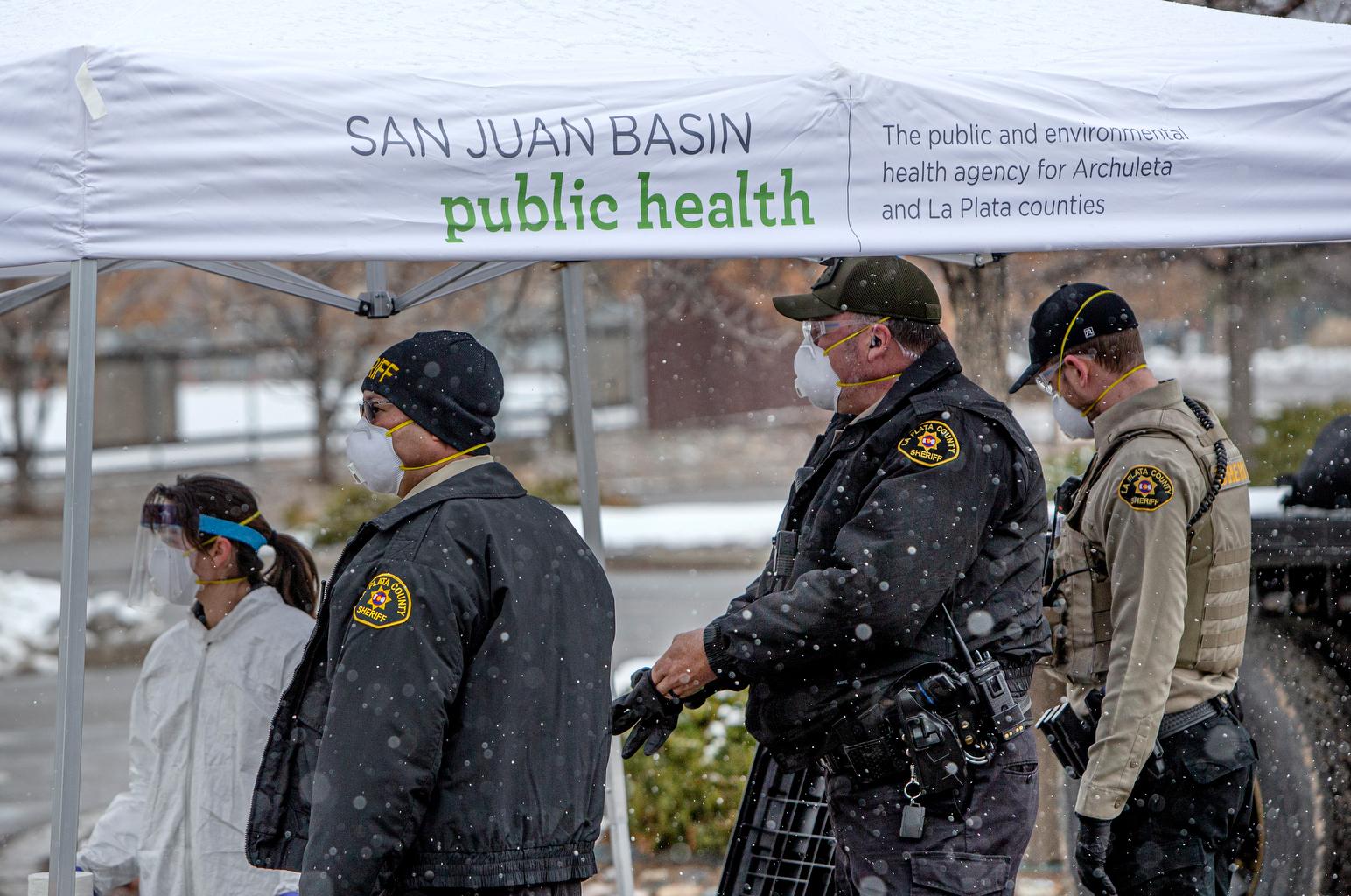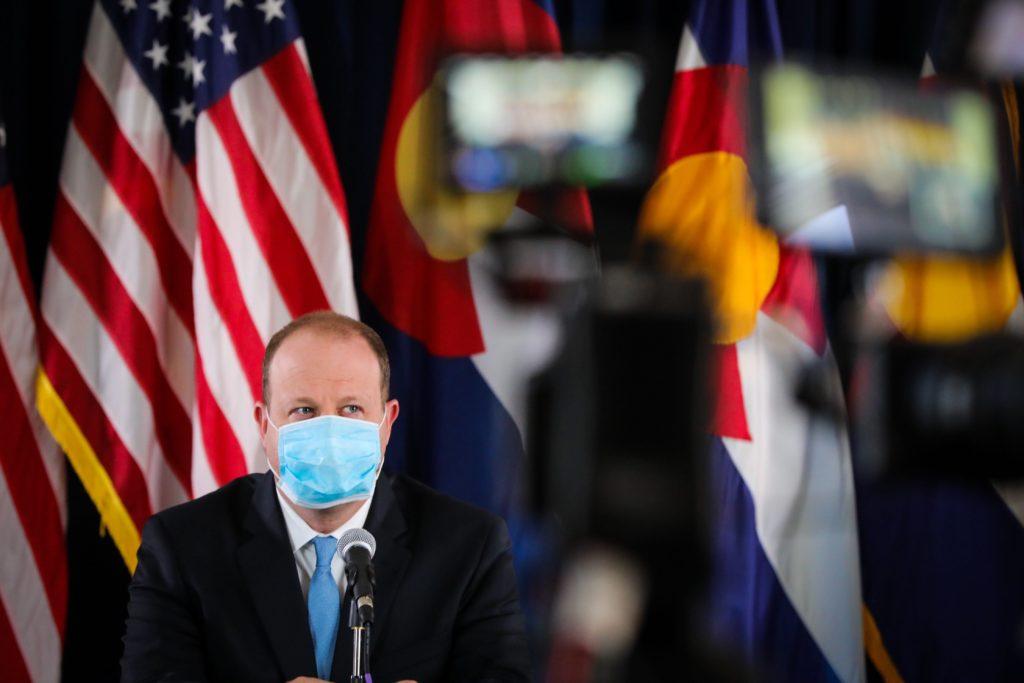
Some smaller Colorado counties are unhappy with how Governor Jared Polis distributed the federal coronavirus relief funds. His decision to allocate the money took many people by surprise, and has left some local officials feeling a mix of frustration, shock, and acceptance.
To deal with the costs of fighting COVID-19, the U.S. Department of the Treasury allocated direct payments to the state’s five largest counties. Money for the rest of the counties and for the state as a whole was given to Colorado in a lump sum of $1.67 billion, and decisions about how to dole it out were left up to the state.
The end result: Smaller counties in Colorado got about half as much money as they requested out of the federal coronavirus recovery bill. Instead, Polis allocated much of the money to public education around the state.
Democratic La Plata County Commissioner Julie Westendorff said smaller and mid-size counties wanted the same amount of money per person that the Treasury gave large counties. “The way it feels, is like the state is backfilling its budget issues on the backs of the 59 smaller counties in Colorado,” she said. “I would certainly like to have a more equitable distribution the next time,” she said, referring to the possibility Congress will approve another aid package. “It just blows my mind,” she said of the governor’s decision.
Westendorff said rural counties like hers, with fewer cases of COVID-19, still have a lot of expenses. “Part of the reason that we don't have as many cases here is because we've been good at the response, and good at the response is not free.”
When it came to distributing the federal funds, Polis was not expected to play the central role. During a press conference on April 17, the governor said he would let state lawmakers take the lead. “The legislature has the power of the purse,” Polis said.
After Polis’ comments, Colorado Counties Inc, a non-profit membership organization of the state’s counties got to work crafting a bipartisan bill to give smaller counties $457 million of the federal money. John Swartout, the executive director of CCI, said the figure was based on making it proportionally equal to what large counties received. “I know the state is Front Range-focused, but the reality is the front line fight on this disease is the county health departments. We’re the ones that had to figure out how to do our own testing. How to make decisions without a lot of data.”
That bill was abruptly scrapped when Polis decided to give the smaller counties $275 million, and keep the remaining money to help with the state’s portion of the response. Swarthout said he’s grateful for any assistance, even if it’s not the full amount the counties wanted.
“Since we started at zero in the negotiations with the governor, $275 million looks pretty good.” The big counties got $176 per person, and the small counties got $109 per person, according to CCI.
Both state and local governments saw revenues plummet when Colorado’s economy shut down. The federal money has restrictions and can’t be used to backfill general budget holes.
“The Governor acted quickly and urgently to get the CARES act money out the door to our local communities and schools,” said a written statement from the governor’s office. A spokesman said the money will help provide a much needed boost to the economy and give schools and local governments the tools they need to adapt to a new reality. The governor’s office insists that the money went out equitably. “The funding is going out proportionally based on population, and rural areas receive the same pro-rata share as urban and suburban areas,” according to a spokesman.
But the governor’s office did not respond when asked for further clarification since that conflicts with numbers provided by the counties and lawmakers.

Republican Sen. Bob Rankin of Carbondale called the governor’s characterization of proportionality “totally wrong.” Rankin serves on the powerful Joint Budget Committee and has criticized Polis for excluding the committee from the funding decisions. Other Republicans also expressed frustration with the overall process.
“It's just unfortunate that we lose representative government when the governor just takes over and says, ‘We're going to do this this way,’” said Republican County Commissioner Byron Pelton, from Logan County on the Eastern Plains. “It would be nice to be able to have our representatives be able to fight for more money for rural Colorado because this pandemic has affected rural Colorado worse than it's affected urban Colorado, meaning economy wise.” Pelton said.
Still, he said he is appreciative of the money his county will get. “We understand the whole state is suffering, but rural Colorado has been hit pretty hard with this.”
Democratic Speaker of the House KC Becker said she was aligned with what the governor wanted to do, and speed was more important than arguing about who should get what, and who should make the decision.
“We wanted to get the money out quickly to entities who have a lot to deal with right now,” Becker said. “We worked with the governor to secure funding for education and local governments and advance the state’s ability to respond to the coronavirus crisis.”
Other Democrats agreed that speed was critical, and going through the legislature would have taken longer.
“I absolutely believe giving money to our local communities quickly is important given the challenges that they’ve faced,” said Democratic Joint Budget Committee member Rep. Julie McCluskie of Dillon. “What we’ve struggled with is how do we do that in a way that complies with the federal guidance and takes into account that the need is great and the need is now.” She said she would keep working to get more money for the state and local communities. “The real answer here is getting federal funding that can be used flexibly. I think that is really the answer for local governments.”
Others were satisfied with the total amount. “I think it's enough money,” said Ouray County Commissioner Ben Tisdel, who is unaffiliated with a political party. He noted that the federal money set aside for states isn’t the only way for counties to get help. Under a different provision of the CARES Act, local health departments would get funding. “Specifically for contact tracing. And that was going to be a large part of the funding, the equal per capita basis that we needed anyway.”
Tisdel said Ouray is starting to reopen and he has seen out-of-state license plates in town. Summer tourism is a huge part of the local economy, and he said there will be new expenses in the age of coronavirus.
“We wanted to print some signs that are consistent across San Juan, San Miguel, Hinsdale and Ouray counties at the entry point to all of our high alpine roads. Just saying, you know, please continue to keep your guard up, practice distancing even in these high alpine areas. Be careful, because of the COVID virus, there may be kind of a delayed EMS response. It's often difficult to get up there anyway.”
Republican Senator Don Coram from Montrose said he believed Polis did what he thought was right. But Coram said the latest funding decision from the governor just reinforced his own desire to get back to work at the state Capitol, which is set to resume Tuesday.
“I think that’s long overdue, that's how I feel about it. My district especially was saying, ‘Where in the hell are you’? How come you're not in Denver?” Coram said.








